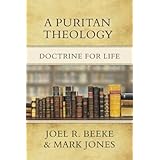
Pages 27-31
Beginning a chapter on assumptions the Puritans had in interpreting the Bible, Beeke/Jones begin with the covenant of works and covenant of grace, detailing similarities and differences. They refer most to Patrick Gillespie's The Ark of the Testament Opened (1681).
With the Puritans and Westminster, I see the need for a distinction between these two covenants, before and after the fall, and appreciate similarities pointed out. I think they contrast the two slightly erroneously at a couple points.
In both covenants, the grace of God brings them about, the reward promised is gracious not merited, God gives the strength needed to keep the covenant, a perfect righteousness is required, both faith and works are required. There is more, but these are the ones more often denied when we simplistically contrast the two. To call the first a covenant of works can be mislead us to think Adam had to obey on his own with no help from God, devoid of any grace. It's all his own merit, by works not by faith. Not true. Adam had to believe God's word about the tree to obey and not eat of it.
In contrasting the two covenants, we see God's glory and Christ's mediation more clearly in the second. Everything the covenant of grace commands the covenant of works also commanded. Ethically there is no "dumbing down" of God's moral standards. So far, so good.
But then it seems we take away some of the similarities asserted on the previous page. Faith is the condition to fulfill the covenant of grace; works was the condition to fulfill the covenant of works (I thought faith and works are operative in both). The ability to keep the covenant was innate to Adam, but is not for us (I thought God's grace was needed for us to keep both). I understand faith and works can both be present in the CoW, while God makes the sole condition the works. But I don't think this is accurate.
I would put it this way: the first covenant was dependent on Adam's faithful obedience. The second is dependent on our faith in Christ's faithful obedience. The Puritans made such a sharp line between faith and works (as we should, following Romans and Galatians), but carried this distinction too far into the pre-fall, post-fall covenants. They had a "dichotomous reading of the Bible" (31).
One example of this is the assertion that after the fall, Adam and all mankind had to go outside of themselves for their righteousness. In one sense this is accurate. Keeping covenant was up to Adam's own obedience and faith before his sin. But part of that faith/work was worshiping God and looking to Him for grace, help, rest, fellowship, etc.
When we empty the covenant of works of God's unmerited (not demerited) grace and Adam's faith (trying to reserve those elements solely for the covenant of grace), we tend to also do the reverse and empty the covenant of grace of our works which flow from faith, and become antinomians ("it's all grace; we don't have to try to keep the law"). That's bad, but we also must avoid the legalism of asserting that the covenant of grace is really about us keeping faith with God as shown by our works. There is a strand of "monocovenantalism" that rejects the distinction between these two covenants that can lead to this. No, our sincere though imperfect faith in Christ leads to imperfect works, God graciously accepts this faith in Christ, imputing the faithful obedience of Christ to our account.
No comments:
Post a Comment